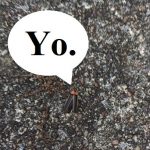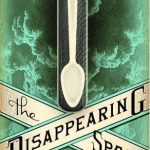October 21, 2011
Originally Invasion of the Body Snatchers was supposed to end with Dr. Miles Benell, played by Kevin McCarthy in the middle of the freeway screaming, “You’re next! You’re next!”, but the studio executives worried that this ending was too depressing and would turn audiences off. Normally when the stuffed shirts want to monkey around with a story to make it, in their opinion, more commercially viable they ruin it. You may know that executives wanted to give Terry Gilliam’s Brazil a radically different ending, which would have wrecked it, and I’ve heard that one executive thought they should cut “that rainbow song” from The Wizard of Oz. Maybe that wouldn’t have hurt the film, but it’s hard to imagine it with the first song being “Ding, Dong, The Wicked Witch Is Dead” instead of “Somewhere Over The Rainbow”.
In the case of Invasion Of The Body Snatchers, though, the normally brainless brass got it right. The opening and closing with Dr. Miles Bennell in a hospital insisting that he’s not crazy nicely frames the story, and makes it even more effective. With Bennell’s narration the only thing we have to go on it would have been easy to dismiss his story as a hallucination, or all just a dream. And what was supposed to be an optimistic ending–hey, there really are giant pods from space being trucked all over the country!–ended up being darker and more disturbing than a man in the middle of the freeway screaming his head off.
There’s been a lot of debate about what Invasion Of The Body Snatchers “means”, and I’ve heard contradictory statements about it being intended as a criticism of both communism and the anti-communist hysteria of the period, and either one or both is possible. Both Kruschev and McCarthy used fear of the other to distract people from the real problems facing the world, and to gain and hold on to power. But the beauty of the story is it’s not an allegory for anything specific, and is open to broad interpretation. Invasion of the Body Snatchers could easily be a metaphor for any major change that happens quickly and seems to rob a person or a group of people or a place of what makes them unique and special.
To me it’s about urban sprawl. It’s about what I saw happen to the neighborhood where I grew up, where tree-covered hills were shaved down to bare dirt so rows of cookie-cutter condos could march across them. There had been woods there, thick and green in the summer and where, in the winter, when the trees were all bare I could see one little shack leaning sideways at the top of a hill. I never knew if someone lived in that shack, far from the roads, or if they ever came out to look in the direction of my house at the same time I was looking at theirs. All that was cut down to be replaced, seemingly overnight, by a building boom that produced uniform real estate that sat empty for months–or in some cases years. And I’ve seen it happen again and again, recently not far from where I live now. There used to be a wooded area I would drive by on a regular basis. Since it was private property I never saw anything past the old rock wall, held together by gravity, that separated it from the street. It was an old farm that had gone back to the wild, and was probably like most wild areas you find in middle Tennessee: a few oaks, maybe a tulip poplar or two. There may have been some exposed areas where rocks that hadn’t been touched by the ocean in millions of years bloomed sea foam lichens, where moss and passion vine and star flowers grew. And lots of cedar trees. Even from the road I could see the cedars. According to the Cherokee legend of the beginning of the world all the plants and animals were tested by having to stay awake for seven days and seven nights. The cedars, and all evergreens, were the only trees who were able to stay awake for the whole period, and their reward is that they keep their leaves through the winter. Also lost, or displaced by the construction, were the animals: squirrels, field mice, lizards, snakes, raccoons, hawks, possums, buzzards, foxes, and even coyotes and deer. An amazing variety can thrive in a small area, and now that it’s gone the coyotes are sniffing around our backyards and trash cans and deer come into yards and run across busy streets. And there are also the owls, who, like the evergreens in the Cherokee legend, stayed awake for seven days and nights and feed on those who sleep. Some nights I hear the owls speak to each other behind our house, or, one night, in the tree right outside the front window. The places the owls have to hunt are becoming smaller and smaller, as is their number. In spite of the similarities between the wild areas each of these places is unique in a way that’s undone when megastores and strip malls move in. And while unused real estate can be restored or renovated it’s harder to make a place go back to its former wild state. Nature can be persistent, but we can also do irreparable damage to the environment, and extinction is forever. The Cherokees didn’t live in this area but only used it for hunting. Most of them were willing to give some of the land to European settlers in a pre-Revolutionary War treaty, but according to some sources a Cherokee leader named Dragging Canoe called this “dark and bloody ground”. He didn’t want to give this land up to the Europeans. Perhaps he saw them as aliens–emotionless aliens from another place who would displace or destroy what he knew and valued, even though Cherokee legends say nothing about chainsaws, bulldozers, or parking lots.
When the owner of the small piece of farmland gone to seed died the residents of the community had little warning about what was coming. Big decisions about our neighborhood were made by outsiders while we slept. It had been a buffer between the neighborhood and the highway, but now if you drive through there you can see the endless string of cars and trucks even over the giant chain stores that went up where there used to be trees. The farmland used to soak up the rainwater that now has to be collected in deep concrete trenches that run like scars alongside the road. And it hasn’t stopped there. The success of strip malls and shopping centers breeds more until opposite sides of the street start to mirror each other. I’ve actually heard it argued that it’s not fair to make people drive as little as two miles, favoring the proliferation of superstores. Even though plans to develop even more of the old farmland that’s further down the road have been beaten back I fear it’s only a matter of time. Already there are “For Sale” signs in the yards of homes in the neighborhood that include the ominous words “Commercial potential.” I’m not opposed to progress, but all too often I think what’s called “progress” is really shortsighted greed, which is the engine that drives the cycles of boom and bust that in the long term benefit only a few and harm many.
Toward the end of Invasion Of The Body Snatchers Miles Benell and a woman he’s fallen in love with, Becky Driscoll, are chased by a mob of former neighbors, now pod people. In other monster films the monster is the minority, an evil other that people must work collectively to overcome. In Invasion Of The Body Snatchers the mob is the monster. Miles and Becky escape by hiding in a cave, but are drawn out by beautiful music. Becky says, “Miles, I’ve never heard anything so beautiful. It means we’re not the only ones left who know what love is.” In fact the music comes from a radio in a truck parked outside a greenhouse where the pods are being mass-produced. As an announcer comes on the truck driver simply switches off the radio, leaving an eerie, heavy silence. Love and beauty, like everything else, have become commodities: transportable and disposable. And they have to be imported from somewhere else.
The film ends by returning to Miles Benell in police custody. Another police officer comes in and announces that a truck full of giant pods has turned over on the highway. Suddenly the ravings of an insane man are confirmed, and one of the doctors who was measuring Benell for a straitjacket picks up a phone and starts asking to speak to the governor, the National Guard, and Washington. Benell leans back against the wall. His fear has turned to exhaustion. This ending was meant to reassure us that everything would turn out all right, but I think we, like Benell, are overwhelmed by a quiet sense of futility. Epidemics are difficult to stop once they’ve started, and in this epidemic the fatality is the ability to feel. Since feelings can be mimicked distinguishing the pod people from the real people is almost impossible. Jack Finney’s original novel The Body Snatchers opens with the warning that the story “will not be neatly tied up at the end, everything satisfactorily resolved.” It could be that while we slept the seeds of our destruction have been sewn.
It is, of course, my favorite movie, and it doesn’t always make me so gloomy. Some late nights when I’m home alone I pull my copy of Invasion Of The Body Snatchers off the shelf and lose myself in the story, in the wonderfully sweeping music, in the creepy greenhouse scene where the pods pop open and froth, in the moment of pure horror when Miles realizes he’s lost Becky, along with everyone else, to the pods. Then, once the credits roll, I turn over and go into deep, dreamless sleep.
This week’s Freethinkers Anonymous is also available as a video essay:






Pingback: I Liebster And Never Flounder. - Freethinkers Anonymous
Great to hear your voice, Chris.
Even when your comments are written I can hear, and always appreciate, your voice behind them.